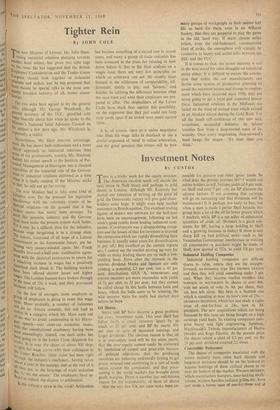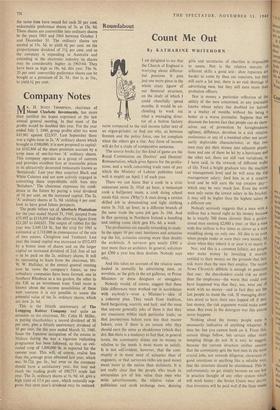Investment Notes
By CUSTOS 'Tills is a tricky week for the equity investor. 1 The American election result will decide the next 'move in Wall Street and perhaps in gold shares in London. Although Mr. Kennedy has denied any intention of writing up the price of gold, the Democratic victory will give gold share- holders some hope. It might even help market sentiment in British equities. The excellent trading figures of MARKS AND SPENCER for the half-year have been an encouragement, following on last week's good results from leading industrial com- panies. (Couttintn.os was a disappointing excep- tion and the lesson of that for investors is to avoid the companies which are rapidly diversifying their business. It usually takes years for diversification to pay off.) But excellent as the current reports are, I cannot see the market moving up very far while so many leading shares are on such a low- yielding basis. Even after the increase in the interim dividend Marks and Spencer are only yielding a potential_ 2.3 per cent. (on a 45 per cent. distribution). GUS 'A,' DEBENHAMS and UNITED DRAPERY are more reasonable with yields of 3f per cent. to 31 per cent., but they cannot be called cheap. In this battle between bulls and bears, which the bulls seem to be winning, the wise investor waits for really bad market days before he buys.
Oil Shares
SHELL and BP have become a great problem for every investment fund. This year Shell has fallen (w:th a small recovery later) by as much as 25 per cent. and BP by nearly 331 per cent. in sp:ic of increased earnings and larger dividends. The obvious reason is that oil is in over-supply (and will be for some years), that the over-supply cannot easily be corrected by limitation of output and price-cuts because of political objections, that the producing countries arc behaving awkwardly (trying to get prices restored and combining in a sort of trade union against the companies), and that price- cutting in the world markets has brought down profit margins. There is another less well-known reason for the unpopularity of these oil shares that the very low UK tax rates make them im-
possible for pension and other 'gross' funds. So what does the private investor do? I would not advise holders to sell, because yields of 6 per cent. on Shell and over 7 per L.mt. on BP discount the adverse factors. (I am assuming that earnings will go on increasing and that dividends will be maintained.) It is perhaps too early to buy, but when a start is made I prefer Shell because this group buys a lot of the oil (at lower prices) which it markets, while BP is a net seller of substantial quantities of crude oil. (Butuvinii is a good sub- stitute for BP, having a large holding in Shell and a growing business in India.) If there is any sharp fall on bad political news—such as the Venezuelan Government interference in existing oil concessions—a purchase might be made of Shell, now quoted at 132s. to yield 5.8 per cent. Industrial Holding Companies
Industrial holding companies are difficult shares to value, unless they are the straight- forward, no-nonsense type like THOMAS TILLING and then they will yield something under 3 per cent. When they become market wonders like NORCROS or SOUTHCROS 5s. shares at over 60s. with net assets of only 3s. 6d. per share, they are best left alone. But here is a Scottish one which is standing at near its year's low of 25s.— GRAMPIAN HOLDINGS, which has just made a rights issue of one-for-four at 24s., now 4s. 3d. premium. The new acquisitions which are being financed by this issue are being bought on a high earnings yield basis. Its existing companies com-
prise heavy and light engineering, furniture, MacDonald's Tweeds (manufacturers of Harris
tweeds) and Kego Electric. At the present price the shares return a yield of 4.2 per cent. on the 24 per cent. dividend covered 2.2 times. Convertible Preference
The shares of companies associated with the motor industry have come back sharply and long-term investors should be on the lookout to acquire holdings of these cyclical shares at or
near the bottom of the market. WILMOT-BREEDEN, which manufacture bumpers, door-locking mech- anisms, window handles, radiator grilles. etc., have just made a bonus issue' of one-for-three and at
the same time have issued for cash 20 per cent. redeemable preference shares of 5s. at 13s. 9d. These shares are convertible into ordinary shares in the years 1963 and 1964 between October I and December 31. The ordinary shares are quoted at 13s. 3d. to yield 4t per cent. on the proportionate dividend of 111 per cent. and as the company is expanding in Australia and extending in the electronic industry its shares may be considerably higher in 1963-64. They have been as high as 18s. 6d. this year. The 5s. 20 per cent. convertible preference shares can be bought at a premium of 2s. 3d., that is, at 16s., to yield 6} per cent.















































 Previous page
Previous page